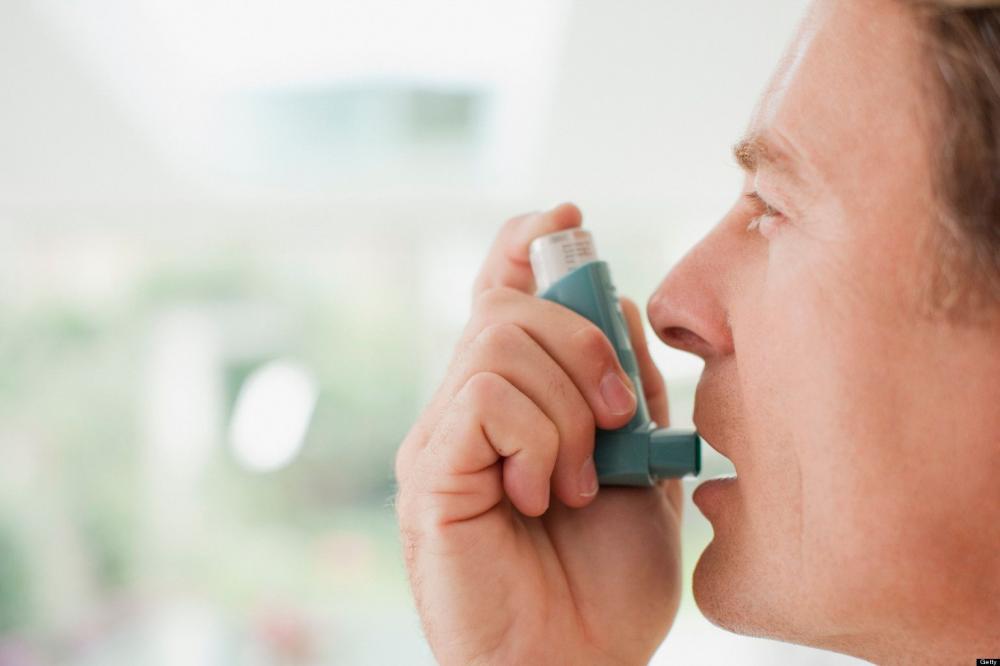
Asthma affects about 1 in every 12 people. It is a long-term condition that can cause coughing, wheezing, chest tightness and breathlessness, with symptoms often worse at night or early in the morning. It can develop at any age but it most commonly starts in younger people. Occasionally, asthma symptoms get gradually or suddenly worse and this is known as an 'asthma attack' or 'exacerbation'.
Causes
Asthma is caused by inflammation of the small tubes (bronchi), which carry air in and out of the lungs. When a person with asthma comes into contact with something that irritates their lungs (a trigger) their airways become narrow, the muscles around them tighten and there is an increase in the production of phlegm causing symptoms.
Common triggers include:
 Dust mites
Dust mites
 Pollen
Pollen
 Cigarette smoke
Cigarette smoke
 Viral infections
Viral infections
 Exercise
Exercise
 Weather conditions
Weather conditions
 Medicines – Particularly the class of painkillers called non-steroidal anti inflammatories eg. Aspirin and Ibuprofen
Medicines – Particularly the class of painkillers called non-steroidal anti inflammatories eg. Aspirin and Ibuprofen
Asthma is more common in people who suffer from or who have a family history of atopic conditions such as eczema, food allergies and hayfever.
Asthma can usually be diagnosed by the GP using a few simple tests. It can, however, be more difficult to diagnose in small infants as many other conditions have similar symptoms.
Treatments
While there is no cure for asthma, there are a number of treatments that can help control the condition. Identifying and avoiding possible triggers is an important means of dealing with asthma.
Inhalers
Inhalers are used to deliver medication directly into the lungs.
There are two main types:
1. Relievers eg. Ventolin, Bricanyl
 These are usually blue in colour.
These are usually blue in colour.
 These relieve symptoms quickly making it easier to breathe, but, they do not reduce the inflammation in the lungs.
These relieve symptoms quickly making it easier to breathe, but, they do not reduce the inflammation in the lungs.
 They are used 'as required' when you feel symptoms.
They are used 'as required' when you feel symptoms.
2. Preventers eg. Becotide, Seretide, Symbicort
 These are often brown, red, orange or purple.
These are often brown, red, orange or purple.
 They work overtime to reduce the inflammation and sensitivity of the airways.
They work overtime to reduce the inflammation and sensitivity of the airways.
 They need to be used regularly, usually twice a day, to be effective.
They need to be used regularly, usually twice a day, to be effective.
If your symptoms are not fully controlled with inhalers, your doctor might add additional inhalers or oral medication.
totalhealth Pharmacist's Advice
 Ask your totalhealth pharmacist to review your inhaler technique as a poor technique means you are not getting the full benefit from your medication.
Ask your totalhealth pharmacist to review your inhaler technique as a poor technique means you are not getting the full benefit from your medication.
 Using a spacer device with your inhaler increases the amount of medication that gets into the lungs making it more effective.
Using a spacer device with your inhaler increases the amount of medication that gets into the lungs making it more effective.
 Always rinse your mouth with water after using your inhaler, especially steroid inhalers, to prevent developing hoarseness and oral thrush.
Always rinse your mouth with water after using your inhaler, especially steroid inhalers, to prevent developing hoarseness and oral thrush.
 All asthmatic patients are recommended to get the annual flu vaccination. Ask your totalhealth pharmacist if you are eligible for a free vaccination.
All asthmatic patients are recommended to get the annual flu vaccination. Ask your totalhealth pharmacist if you are eligible for a free vaccination.
 For further information on asthma ask your totalhealth pharmacist or go to www.asthma.ie
For further information on asthma ask your totalhealth pharmacist or go to www.asthma.ie